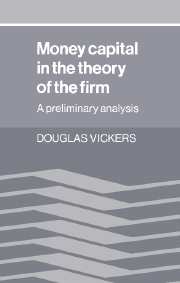3 - The concept and relevance of economic value
Published online by Cambridge University Press: 18 September 2009
Summary
The concept of income is logically prior to the concept of value. The economic value of an asset depends on the future stream of benefits that the asset will, or is expected to, provide. In the case of an asset, such as we are preponderantly concerned with in the theory of the firm, which is expected to earn a specifiable amount of income or realize a definable cash flow in the future, its economic value is defined as the present value, or the present discounted or capitalized value, of that prospective income stream.
Our purpose in this chapter is to make these concepts related to economic value more precise and thereby lay the foundation for visualizing the determinants of value in more complex cases. In this chapter we shall not give an adequate account of the relevance to the valuation problem of the presence of risk or uncertainty. That important issue must await the subsequent development, in the neoclassical case, of the apparatus of probability and its application to the definition of risk and, in the later postclassical case, the development of the potential surprise analysis.
Economic valuation rests on the proposition that a dollar available today is worth more than a dollar available tomorrow or next year or at some other time in the future. This is not simply a matter of saying that a bird in the hand is worth two in the bush.
- Type
- Chapter
- Information
- Money Capital in the Theory of the FirmA Preliminary Analysis, pp. 41 - 56Publisher: Cambridge University PressPrint publication year: 1987



